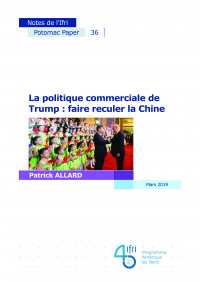Gateway to Think Tanks
| 来源类型 | Publications - Policy Papers - Potomac Papers |
| 规范类型 | 简报 |
| DOI | 979-10-373-0014-0 |
| La politique commerciale de Trump : faire reculer la Chine Potomac Paper, No. 36, March 2019 | |
| Patrick ALLARD | |
| 发表日期 | 2019-03-18 |
| 出处 | Potomac Papers |
| 出版年 | 2019 |
| 概述 | Although not akin to the protectionist policies practiced by the United States through the 1930s, the trade war launched by the Trump administration since early 2018 challenges the principles and institutions of free trade. |
| 摘要 |
La politique commerciale de Trump : faire reculer la Chine Potomac Paper, No. 36, March 2019
Although not akin to the protectionist policies practiced by the United States through the 1930s, the trade war launched by the Trump administration since early 2018 challenges the principles and institutions of free trade.  The taxes and barriers currently put in place correspond to certain exceptional legal provisions in the General Agreement on Tariffs and Trade (GATT) and the World Trade Organization (WTO) texts and rely on US trade laws predating the WTO. Trump’s trade policy enjoys a level of bipartisan consensus in the country today, centered around the idea of improving the conditions of trade with partners while hampering the growing power of China. The "optimal tariff" theory explains the benefits for great economic powers such as the US of high customs duties, as a lever to compel trade partners to open their domestic markets or to renounce economic policies considered harmful to US interests. President Trump thus imposed the renegotiation of regional agreements such as the North American Free Trade Agreement (NAFTA) and the United States-Korea Free Trade Agreement (KORUS). He also favors the negotiation of bilateral or regional agreements rather than the global mechanisms of the WTO, which he denounces. Despite the hype, the consequences of this American-led return of protectionism could in fact remain modest for the World economy and even for international trade. In the case of the European Union (EU), where trade negotiators seem to be holding their ground in the face of Trump’s demands, the reduction of US-China trade could allow an increase of exports to the US. Above all, sorting out China’s fraudulent commercial practices and reforming WTO rules, as required by president Trump, would ultimately be a very positive step forward. The return of tariffs and the proliferation of non-WTO trade agreements, however, remain contrary to the philosophy of openness that presided over international economic relations from 1945 to this day. Ultimately, two parallel trading systems – an American one and a Chinese one – could emerge. Taken by surprise, China has yet to elaborate a clear response to what is certainly a challenge to its desire to expand its economic and commercial power around the world. China’s reaction will be decisive.
This content is available in French : "La politique commerciale de Trump : faire reculer la Chine" |
| 关键词 | Donald Trump International Trade WTO Xi Jinping China European Union United States |
| URL | https://www.ifri.org/en/publications/notes-de-lifri/potomac-papers/politique-commerciale-de-trump-faire-reculer-chine |
| 来源智库 | French Institute of International Relations (France) |
| 引用统计 | |
| 资源类型 | 智库出版物 |
| 条目标识符 | http://119.78.100.153/handle/2XGU8XDN/416489 |
| 推荐引用方式 GB/T 7714 | Patrick ALLARD. La politique commerciale de Trump : faire reculer la Chine Potomac Paper, No. 36, March 2019. 2019. |
| 条目包含的文件 | ||||||
| 文件名称/大小 | 资源类型 | 版本类型 | 开放类型 | 使用许可 | ||
| couv_potomac_36_page(32KB) | 智库出版物 | 限制开放 | CC BY-NC-SA |  浏览 | ||
| la_politique_commerc(1784KB) | 智库出版物 | 限制开放 | CC BY-NC-SA | 浏览 | ||
除非特别说明,本系统中所有内容都受版权保护,并保留所有权利。